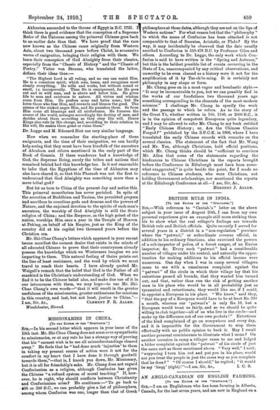MISSIONARIES IN CHINA.
[To THE EDITOR OF THE "SPECTATOR."]
Srp,—In his second letter which appears in your issue of the 10th inst. Mr. Shi-Chao Chang does not seem over-sympathetic to missionaries, or at any rate he has a strange way of proving that his " earnest wish is to see all misunderstandings cleared away." He feels that he " had done much injustice' to them in taking my present course of action were it not for the comfort in my heart that I have done it through goodwill towards them,"—that is, I knock you down, Mr. Missionary, but it is all for friendship's sake. Mr. Chang does not regard Confucianism as a religion, although Confucius has given the Chinese "a refined system of moral teaching." If, how- ever, he is right, why should conflicts between Christianity and Confucianism arise P He continues :—" To go back to 400. or 300 B.C., we can probably give a list of philosophers, • among whom Confucius was one, longer than that of Greek
philosophers at these, dates, although they are not on the lips of Western nations." For what reason but that the " philosophy " to which the name of Confucius has been attached is not comparable to that of Socrates, Aristotle, or Plato P By the way, it may incidentally be observed that the date usually ascribed to Confucius is 550-478 B.C. by Professor Giles and others. According to Dr. Legge, the only work which Con. facials is said to have written is the "Spring and Autumn," but this- is the baldest possible list of events occurring in the State of Lu, unaccompanied by any critical observations, and unworthy to be even classed as a history were it not for the amplification of it by Tao-dila-ming. it is certainly not philosophy in any shape or form.
Mr. Chang goes on in a most vague and bombastic style:- " It may be inconceivable to you, but we can possibly find in the- works of our forefathers two thousand years ago something corresponding to the elements of the most modern sciences." I challenge Mr. Chang to specify the work and the passage to which he refers. As to the story of the Great Yii, whether written in 100, 1100, or 2000 B.C., it is in the opinion of competent Europeans quite legendary, and I may be allowed to refer Mr. Chang to my book entitled "Early Chinese History ; or, Are the Chinese Classics Forged P" published by the S.P.C.K. in 1906, where I have translated the early Chinese records with remarks on the several classics. The statement of the fact that Mr. Wang and Mr. Yen, although Christians, hold official positions, which Mr. Chang thinks should be "sufficient to convince Mr. Allen that some of the statements regarding the hindrances to Chinese Christians in the reports brought before the Conference in Edinburgh must have been some- what exaggerated," is quite beside the point, for I made no reference to Chinese students, who were Christians, not holding Government scholarships, nor mentioned the reports at the Edinburgh Conference at alL—I am, Sir, &c.,
HERBERT J. ALLEN.










































 Previous page
Previous page